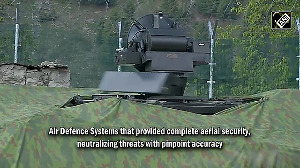Investigations into terror attacks have made little headway since terror groups prefer to keep their identity concealed after an attack, says Vicky Nanjappa.
Wednesday's high court blast in Delhi has left investigating agencies in a state of confusion. A mail that was sent out earlier in the day is the only lead that investigators have. However, there is still suspicion regarding the authenticity of the mail.
A 20-member team of the National Investigating Agency has already begun its probe. The team now awaits the results from the Forensic Sciences Laboratory, which is examining the bomb composition.
Although the composition will be known in a couple of days, it may not really help the agency zero down on any particular outfit.
A couple of years back terror groups had a signature style of attack. The bombs assembled during the twin blasts in Hyderabad gave vital leads to the police since the bomb that was assembled bore a signature. Intelligence Bureau officials say that each terror group had a signature styled bomb, which made it easier to track the outfit. The Students Islamic Movement of India, Indian Mujahideen, Harkat-ul-Jihad-al-Islami all had their own style of packaging and also planting a bomb.
However, today, that has changed. Terror groups have become extremely careful not to reveal their identity when an attack has been carried out. Earlier, terror groups wanted their identity to be known since it was a matter of pride for them. However, the terror scenario has changed a great deal and terror groups prefer to keep their identity concealed.
This change has basically made investigation a nightmare for the police. Blast cases will not be easy to investigate in the days to come. It has become a cat and mouse game between terror groups and the police and the latter are sure going to find it very difficult to crack these cases.
A police officer pointed out that nowadays with each blast the investigations need to start from scratch unlike the past where they could rely heavily on information obtained from earlier blasts.
The blasts earlier had a connection and all the police needed to do was to join the dots. Moreover, when the Indian Mujahideen carried out blasts, they also gave the police the privilege of a full-fledged mail that gave the first lead. Now, this too is missing and terror groups have become smarter and try their best to conceal their identity as much as possible.
Police sources say that they will have to rely much more on human intelligence in the days to come. These blasts that are taking place may not be undertaken by full-fledged terror groups and could be the handiwork of one or two people. This would mean that the police will have go back and rely on age-old tactics to crack the case. This means they will have to activate their sources on the ground (anti-social elements) and seek information from them.
They will also have to rely heavily on statements given by those people present before the blast to find out if they saw anything suspicious.
Each of the latest incidents of terror would need to be treated as a fresh case and the investigations need to be independent in nature. There is no point in relying on signatures and also information from previous blasts. One thing is clear that none of these blasts in the past two years are inter-connected.







